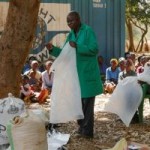Farmer hiring of agricultural machinery services is common in South Asia. Informal fee-for-service arrangements have positioned farmers so they can access use of machinery to conduct critical, time-sensitive agricultural tasks like land preparation, seeding, irrigation, harvesting and post-harvesting operations. However, both the provision and rental of machinery services are currently dominated by men, and by […] Source: IFPRI Bangladesh Country Office
Scaling up agriculture technologies in Malawi: A study of approaches used by agriculture research and development organizations
A new IFPRI-led study assessed the scaling up of agricultural technologies—that is, the approaches and methods that agricultural research and development organizations use to increase the share of households which are regularly using such technologies to improve their agricultural performance. Over the years, several technologies have been developed to help improve agriculture, particularly in developing >> Read more Source: Malawi Strategy Support Program
Why farmers adopt certain technologies but leave out others
Exactly 125 years ago, John Augustus Voelcker, a British Agricultural Scientist, warned in his ‘Report on the Improvement of Indian Agriculture’: “India is a country about which one cannot make a ‘general remark’ and, certainly, with regard to Indian a... Source: IFPRI South Asia Office
Do men and women benefit equally from technology adoption? New paper explores
Researchers have sought to understand what keeps women’s observed rates of agricultural technology adoption low. But what happens after a new technology is adopted by a household? Do women’s lives really become better? Are they more empowered? A new paper explores these questions using the example of adopting small-scale irrigation technologies in Ethiopia, Ghana, and Tanzania.
Discussion Paper 1654: Limited Attention and Information Loss in the Lab-to-Farm Knowledge Chain: The Case of Malawian Agricultural Extension Programs
Agricultural extension plays a crucial role in promoting agricultural productivity, increasing food security, improving rural livelihoods, and promoting agriculture as an engine of economic growth in developing countries. Yet, for agricultural knowledge to move from theory into practice, or from lab to field, extension services provide a critical linkage directly to farmers. In a new […]

